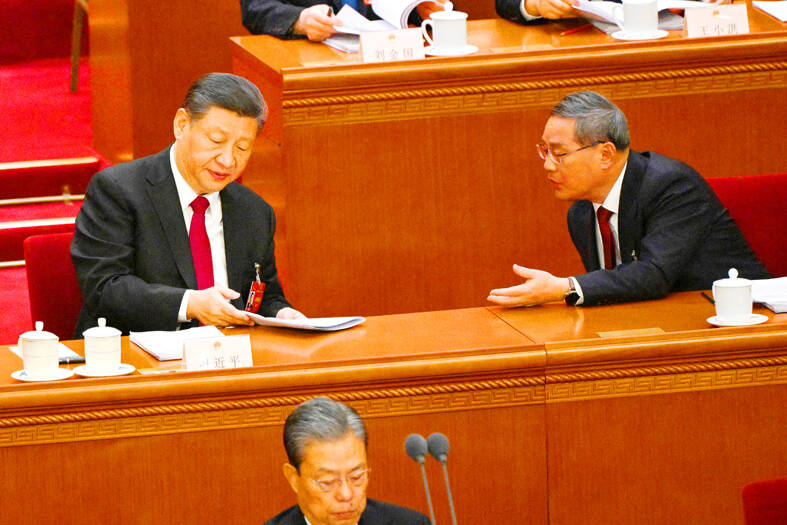Chinese Premier Li Qiang (李強) yesterday announced an ambitious economic growth target of about 5 percent for this year, promising steps to transform the nation’s development model and defuse risks fueled by bankrupt property developers and indebted cities.
Li was delivering his maiden work report at the annual meeting of the National People’s Congress, China’s rubber-stamp parliament.
In setting a growth target similar to last year, which would be harder to reach as a post-COVID-19 pandemic recovery is losing steam, Beijing signals it is prioritizing growth over any reforms even as Li pledged bold new policies, analysts said.

Photo: AFP
“It’s more difficult to achieve 5 percent this year than last year because the base number has become higher, indicating that the top leaders are committed to supporting economic growth,” Soochow Securities chief macro analyst Tao Chuan said.
Last year’s uneven growth laid bare China’s deep structural imbalances, from weak household consumption to increasingly lower returns on investment, prompting calls for a new growth model.
China started the year with a stock market rout and deflation at levels unseen since the global financial crisis of 2008-2009. The property crisis and local government debt woes persisted, increasing pressure on China’s leaders to come up with new economic policies.
“We should not lose sight of worst-case scenarios,” Li said in the Great Hall of the People in Tiananmen Square.
“We must push ahead with transforming the growth model, making structural adjustments, improving quality and enhancing performance,” he said.
However, there was no timeline or concrete details for the structural changes China intended to implement, with Li also emphasizing stability as “the basis for everything we do.”
Li acknowledged that reaching the target “will not be easy,” adding a “proactive” fiscal stance and “prudent” monetary policy was needed.
The target considers “the need to boost employment and incomes and prevent and defuse risks,” he said.
The IMF projects China’s growth at 4.6 percent for this year, declining toward 3.5 percent in 2028.
Adding to the challenges, the 3 percent inflation target announced at the National People’s Congress means the country is aiming for nominal growth of about 8 percent again this year.
In reality, China is battling the longest period of deflation since the late 1990s, meaning the economy only expanded 4.6 percent last year, before adjusting for inflation. With prices still falling, a strong expansion would be hard to achieve.
Additional reporting by Bloomberg

TRAGEDY STRIKES TAIPEI: The suspect died after falling off a building after he threw smoke grenades into Taipei Main Station and went on a killing spree in Zhongshan A 27-year-old suspect allegedly threw smoke grenades in Taipei Main Station and then proceeded to Zhongshan MRT Station in a random killing spree that resulted in the death of the suspect and two other civilians, and seven injured, including one in critical condition, as of press time last night. The suspect, identified as a man surnamed Chang Wen (張文), allegedly began the attack at Taipei Main Station, the Taipei Fire Department said, adding that it received a report at 5:24pm that smoke grenades had been thrown in the station. One man in his 50s was rushed to hospital after a cardiac arrest

A car bomb killed a senior Russian general in southern Moscow yesterday morning, the latest high-profile army figure to be blown up in a blast that came just hours after Russian and Ukrainian delegates held separate talks in Miami on a plan to end the war. Kyiv has not commented on the incident, but Russian investigators said they were probing whether the blast was “linked” to “Ukrainian special forces.” The attack was similar to other assassinations of generals and pro-war figures that have either been claimed, or are widely believed to have been orchestrated, by Ukraine. Russian Lieutenant General Fanil Sarvarov, 56, head

SAFETY FIRST: Double the number of police were deployed at the Taipei Marathon, while other cities released plans to bolster public event safety Authorities across Taiwan have stepped up security measures ahead of Christmas and New Year events, following a knife and smoke bomb attack in Taipei on Friday that left four people dead and 11 injured. In a bid to prevent potential copycat incidents, police deployments have been expanded for large gatherings, transport hubs, and other crowded public spaces, according to official statements from police and city authorities. Taipei Mayor Chiang Wan-an (蔣萬安) said the city has “comprehensively raised security readiness” in crowded areas, increased police deployments with armed officers, and intensified patrols during weekends and nighttime hours. For large-scale events, security checkpoints and explosives

PUBLIC SAFETY: The premier said that security would be tightened in transport hubs, while President Lai commended the public for their bravery The government is to deploy more police, including rapid response units, in crowded public areas to ensure a swift response to any threats, President William Lai (賴清德) said yesterday after a knife attack killed three people and injured 11 in Taipei the previous day. Lai made the remarks following a briefing by the National Police Agency on the progress of the investigation, saying that the attack underscored the importance of cooperation in public security between the central and local governments. The attack unfolded in the early evening on Friday around Taipei Main Station’s M7 exit and later near the Taipei MRT’s Zhongshan